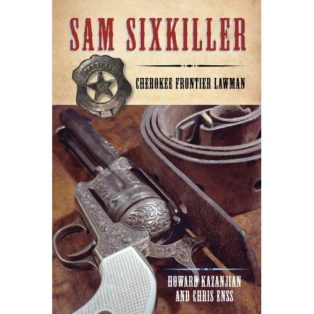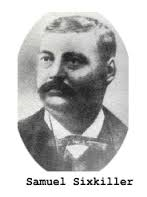Enter now to win a copy of
Sam Sixkiller: Cherokee Frontier Lawman

Captain Sam Sixkiller crossed the timber-lined banks of the Arkansas River atop a big, brown roan. The well-traveled trail that lay out in front of him looked like an ecru ribbon thrown down across the prairie grass. Riding a few paces behind the lawman was Deputy Bill Drew. Neither man spoke as they traveled. A herd of cattle in the near distance plodded along slowly toward a small stream. A couple of calves held back, bawling for their mothers, who had left them a safe distance behind. Upon reaching the stream the cows buried their noses in the water. They paid no attention to the approaching riders as they enjoyed a refreshing drink.
Captain Sixkiller pulled back on the reins of his horse, slowing the animal’s pace. He stared thoughtfully, considering the proximity of the cattle to the crude camp behind the field of prairie grass reaching to the horizon. Deputy Drew watched the captain, waiting for the officer to proceed. Both men knew the danger inherent in the job they’d set out to do that day in early January 1886. They were tracking a murderer named Alfred “Alf” Rushing, also known as Ed Brown.
Nine years prior to Captain Sixkiller leaving Muskogee on a cold winter’s day to apprehend Rushing, the elusive rowdy had shot and killed the marshal of Wortham, Texas. The Houston and Texas Central Railway ran through this busy cotton farm community, attracting nefarious characters like Rushing, a cattle rustler and bootlegger who hoped to make a fortune selling liquor and robbing business owners in the farming town. On December 8, 1879, Rushing and two accomplices had ridden into Wortham and made their way to J. J. Stubb’s general store. All three were armed with shotguns and hell-bent on retrieving a pistol they claimed Stubbs had stolen from them.
It wasn’t the first time Stubbs had been accused of stealing the pistol from Rushing. Although Stubbs denied taking the gun, the men continued to come around and harass him for the item. They refused to accept the storeowner’s claim that he knew nothing of it. Rushing finally told him he intended to get seventeen dollars for the weapon before he left or there would be “hell to pay.”

To learn more about the courageous lawman Sam Sixkiller read
Sam Sixkiller: Cherokee Frontier Lawman

